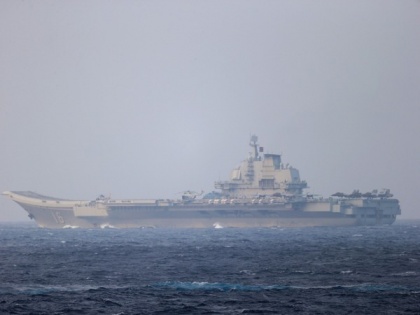US, South Korea, Japan emphasize importance of Taiwan Strait peace
By ANI | Published: July 21, 2021 07:51 PM2021-07-21T19:51:21+5:302021-07-21T20:00:03+5:30
Amid China's aggressive behaviour in the Indo-Pacific region, the United States, South Korea and Japan have said that they oppose any unilateral attempts to change the status quo in the East China Sea and emphasized the importance of preserving peace and stability in the Taiwan Strait.

US, South Korea, Japan emphasize importance of Taiwan Strait peace
Amid China's aggressive behaviour in the Indo-Pacific region, the United States, South Korea and Japan have said that they oppose any unilateral attempts to change the status quo in the East China Sea and emphasized the importance of preserving peace and stability in the Taiwan Strait.
US Deputy Secretary of State Wendy R. Sherman met with Japanese Vice Foreign Minister Mori Takeo and Republic of Korea First Vice Foreign Minister Choi Jong Kun on Wednesday in Tokyo.
During the meeting, the Deputy Secretary and the two vice foreign ministers committed to deepening trilateral cooperation to address the global challenges of the 21st century, including the climate crisis, pandemic response and economic resilience and recovery.
They also discussed the shared commitment of the United States, Japan and the Republic of Korea to work towards complete denuclearization of the Korean Peninsula and their intent to address the threat posed by the nuclear and ballistic missile programs of the Democratic People's Republic of Korea.
In addition, they discussed combined efforts to promote peace, security and prosperity in the Indo-Pacific and around the world, based upon our shared values of defending freedom, championing economic opportunity, upholding human rights, and respecting the rule of law.
"The Deputy Secretary and the two vice foreign ministers reiterated opposition to all activities that undermine, destabilize, or threaten the rules-based international order; affirmed the need to maintain an inclusive, free, and open Indo-Pacific; opposed any unilateral attempts to change the status quo in the East China Sea; and pledged to maintain peace and stability, lawful unimpeded commerce, and respect for international law, including freedom of navigation and overflight in the South China Sea and beyond," US State Department spokesperson Ned Price said in a statement.
The Deputy Secretary stressed the importance of support for gender equity and equality and LGBTQI+ rights, the spokesperson added.
The discussion also emphasized the importance of preserving peace and stability in the Taiwan Strait.
The Deputy Secretary and the two vice foreign ministers reaffirmed support for ASEAN centrality and the ASEAN-led regional architecture. They also discussed efforts to support the people of Myanmar in promoting a return to democracy.
Indo-Pacific region is largely viewed as an area comprising the Indian Ocean and the western and central Pacific Ocean, including the South China Sea.
China's territorial claims in the South China Sea and its efforts to advance into the Indian Ocean are seen to have challenged the established rules-based system.
Tensions in the Taiwan Strait are escalating. This focus on the strait comes after China ramped up political pressure and military threats against Taiwan, with almost daily incursions into Taipei's air defence identification zone.
The Taiwan Strait is a 180-kilometre-wide strait separating the island of Taiwan and continental Asia. It is one of the most heavily policed strips of water in the world, patrolled by both Chinese and Taiwanese navy and coastguard vessels.
( With inputs from ANI )
Disclaimer: This post has been auto-published from an agency feed without any modifications to the text and has not been reviewed by an editor
Open in app